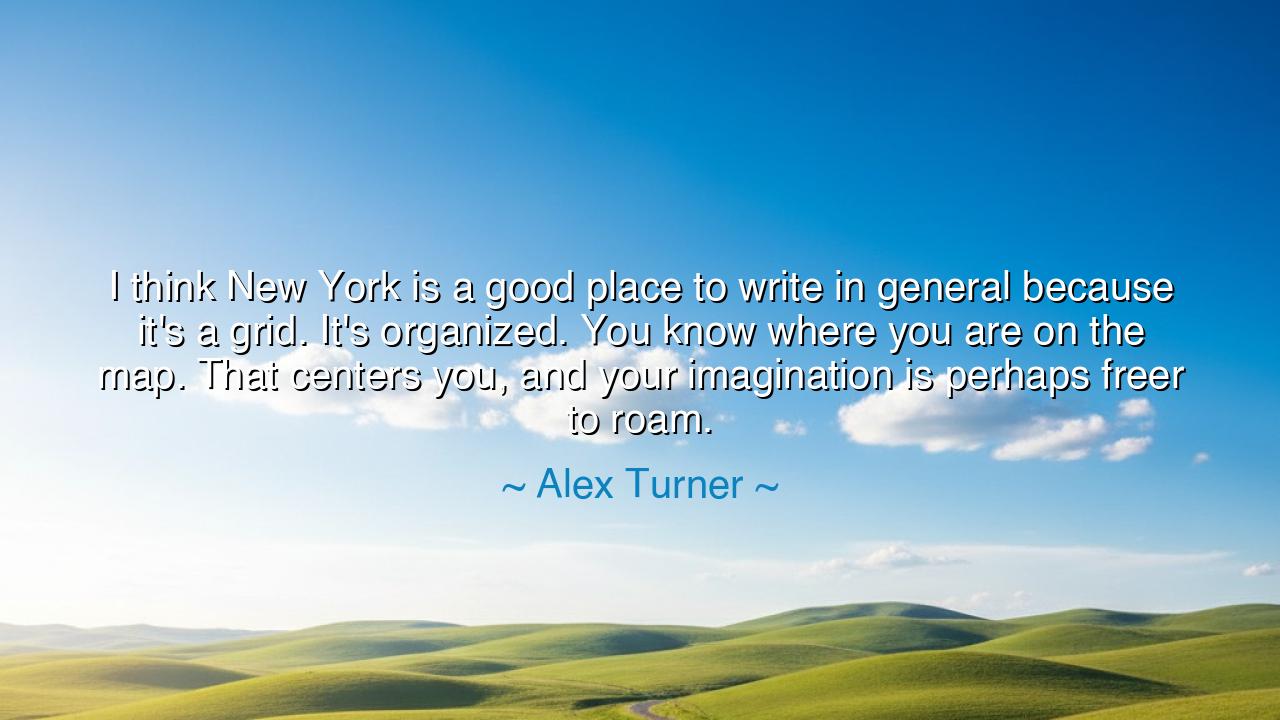
I think New York is a good place to write in general because it's
I think New York is a good place to write in general because it's a grid. It's organized. You know where you are on the map. That centers you, and your imagination is perhaps freer to roam.






“I think New York is a good place to write in general because it’s a grid. It’s organized. You know where you are on the map. That centers you, and your imagination is perhaps freer to roam.” – Alex Turner
In this thoughtful reflection, Alex Turner, poet, lyricist, and frontman of Arctic Monkeys, speaks not only of a city but of the eternal balance between structure and freedom, between order and creativity. His words, spoken in passing about New York, rise beyond geography; they become a meditation on the human mind itself. Turner, like the philosophers and artists before him, understood that true imagination does not flourish in chaos but within a framework that gives it strength. The grid of New York — its straight lines, its numbered streets, its predictable logic — becomes a metaphor for the mental clarity that allows the spirit to wander without fear of losing itself.
For there is a paradox hidden in his observation: that discipline gives birth to liberty. When Turner says that knowing where one is “centers you,” he speaks to an ancient truth — that stability is the foundation of all great creation. The mind that is anchored is the mind that dares to voyage. Just as a ship requires a compass to explore the endless ocean, the artist needs a sense of direction, however faint, to travel through the infinite expanse of thought. Imagination without grounding becomes a storm; with grounding, it becomes the wind that fills the sails of genius.
Consider the example of Leonardo da Vinci, who embodied this harmony of order and inspiration. Though his paintings seem to breathe with divine spontaneity, beneath every brushstroke lies the geometry of precision — lines, ratios, and perspective learned through study. Leonardo’s imagination soared because his intellect was disciplined. He could wander through the boundless fields of invention only because he first understood the structure of the world. In him, as in Turner’s vision of New York, organization was not a cage, but a map that freed the mind to roam further.
And so it is with cities, and with souls. The grid of New York — its unshakable rhythm of avenues and streets — provides a strange comfort to the wandering heart. It tells the artist, “You cannot be lost here.” That assurance, that invisible hand of order, liberates the imagination from the fear of confusion. The writer in New York, grounded by the logic of the streets, can let his thoughts spiral into wildness, knowing he can always return to the numbered calm of his surroundings. In that rhythm, structure becomes sanctuary, and from sanctuary, art is born.
Yet this truth is not confined to one city. Every life must find its grid — its pattern of meaning, its framework of self-discipline. Without it, the mind drifts endlessly, scattering its light in a thousand directions. But when a person builds their inner map — through routine, through clarity, through purpose — they become like the artist in New York, free to dream with precision. The ancients knew this balance well. The Greek philosophers who gazed at the stars also built systems of logic; the monks who illuminated sacred texts lived by strict hours of prayer and silence. Their freedom of imagination was not despite their structure — it was born of it.
In Turner’s reflection, there also lies a subtle reverence for place — for the way a setting can shape the spirit. He speaks as one who understands that creation is not born in isolation, but in communion with one’s surroundings. Just as the desert inspired prophets and the sea stirred explorers, so the city’s architecture can steady the mind and ignite the heart. To know one’s place in the world’s map is to know where the horizon begins. From that sense of belonging, the imagination can stretch toward infinity.
So let this be the lesson drawn from Turner’s insight: find your grid, and then let your imagination roam. Build your life with enough order to steady you, but not so much that it confines you. Keep your days marked by rhythm, your thoughts guided by purpose, and your spirit open to wonder. Whether you dwell in the noise of cities or the silence of mountains, let your inner map be strong enough to hold your dreams. For only when the heart is centered can the imagination fly without fear.
Thus, in Alex Turner’s simple meditation on New York, we discover a timeless truth: freedom is not the absence of structure, but the harmony between structure and flight. The grid keeps the dreamer grounded, the dream keeps the grid alive — and from that union, art, wisdom, and beauty are born.






AAdministratorAdministrator
Welcome, honored guests. Please leave a comment, we will respond soon